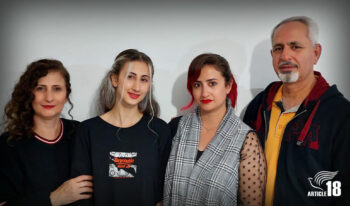Touraj and Elaheh’s youngest daughter, Elina, had just turned 10 years old and was still asleep when intelligence agents came to raid her home.

(Article 18)
In fact, it was the sound of one of the agents’ voices that awoke Elina that day, and the scene that followed was a painful one not only for the little girl, but also for her mother and older sister, Arghavan.
“She was terrified,” Elina’s mother recalls, “running around the room, shaking, crying and asking in a panic: ‘What happened? What has happened?’”
Elaheh embraced her youngest daughter, and one of the agents even tried to make her feel better, telling her to think of him as her “uncle”. But a moment later Elaheh and her two daughters – Elina’s older sister was 20 at the time – were ordered to go into their lounge and sit in different corners and not to talk to each other.
Meanwhile, the agents ransacked their home, looking for any proof of what they suspected – that the family were Christian converts.
Sure enough, they found it, eventually filling 12 bin bags with confiscated items, including everything from Bibles and Christian books, to a painting of the Last Supper and Christmas-tree decorations.
At the same time, Elaheh was ordered to call her husband, who was at work, and an agent grabbed the phone before he answered, telling Touraj to return home immediately.
When he did, Touraj found the agents rummaging through his wife and daughters’ clothes and says he “got angry several times and said, ‘Either you bring a female agent, or you aren’t allowed to search our private things!’”
But much worse was to follow.
One of the agents told Elaheh that they had decided to have “mercy” upon her because of her children – by not taking her away, and only Touraj – but this was still too much for little Elina to bear.
“She was crying, and saying: ‘Don’t take my dad! Please don’t take my dad!’” Elaheh recalls. “They lied to her: ‘Don’t worry; your father will return by evening.’”
In fact, Touraj was held for the next eight days in the ward of Isfahan’s Dastgerd Prison which is under the jurisdiction of the Ministry of Intelligence: known as “Alef-Ta”, or “A.T.”
During Touraj’s detention, he was interrogated twice a day for at least two hours at a time – once in the afternoon, and then again at midnight.
“Sometimes they also interrogated me at 5 in the morning,” he adds.
But while the interrogations themselves were hard to bear, as Touraj and his new Christian faith were subjected to severe insults, he says it was the threats to his family that were most difficult.
“The interrogator threatened to harm my family if I didn’t cooperate,” Touraj explains. “He said: ‘Write down the names of anyone you know [from the house-church]. Otherwise, we’ll bring your wife and unmarried daughter here and do everything to them that we are capable of! If you love them, you should cooperate with us.’
“Once, he even took me to a cell where about 15 dangerous criminals were kept and said: ‘We’ll bring your daughter here to be raped!’ I cried a lot and couldn’t bring myself to even contemplate such a thing happening.”
“I was ready to be physically tortured,” Touraj adds, “but not for these threats against my family.”
Another moment of Touraj’s detention which he describes as “one of the hardest days of my life” was when he was told he was to be brought before a judge, only to be stopped along the way and forced to witness a very traumatic scene.
“The officer removed my blindfold, and I saw a person standing in a courtyard, and around 10 to 15 members of his family sitting next to him, crying profusely and kissing him,” Touraj remembers. “I asked: ‘Why are they crying?’ and the officer came close to my ear, and said: ‘This will also be your fate. This prisoner is going to be executed tomorrow at 5.30am. This is his final meeting with his family before his execution. We will make the same visitors’ appointment for you.’ The scene and this officer’s words really shook me, and I cried a lot.”
Meanwhile, outside prison, Touraj’s wife and mother were made to endure similar fears.
When they went to see a Revolutionary Court judge to ask about Touraj’s case, the judge told his mother: “Look at this thick file! It’s your son’s! Go and pray he won’t be executed!”
They were then told they must deposit bail equivalent to $62,500 – 15 times the average annual salary at the time – for Touraj’s temporary release, and Elaheh says that “everyone who heard the large bail amount assumed my husband was about to be executed”.
In the end, Elaheh’s brother had to submit the deeds to his and his wife’s home to cover Touraj’s bail, but it was another 18 months until the trial took place, and Elaheh says it was “difficult” to live in “this state of uncertainty”, while her brother and his wife were “worried about their property deed”.
The judge told Touraj that the Ministry of Intelligence had suggested a sentence of two years for his “apostasy”, but that he would “have to go to prison for a further five years because of the things you have done!”
Touraj was then asked if he was ready to sign a “commitment” and, assuming the judge meant that he must recant his faith, Touraj said “no”.
In the end the judge only asked Touraj to pledge “not to force anyone to convert to Christianity”, nor “participate in meetings where you will be taught about Christianity” and, reluctantly, Touraj signed the sheet.
But when Arghavan’s husband, Farzad, was arrested a few months later, Touraj’s number was spotted among his contacts and he feared the worst.
“I had pledged not to associate with other Christians, or I would have to go to prison for those seven years [five from the judge and two from the Ministry of Intelligence] in addition to any new sentence,” he explains.
“They called us and Farzad’s mother regularly. I didn’t answer their calls, and Farzad’s mother told them she didn’t have any information about her son. But the situation felt very precarious, and we decided to flee Iran.
“We took only a few suitcases with us, and on 22 July 2016 we left our home behind, with all our belongings still inside.”
More than seven years later, Touraj reflects that although he was detained for a relatively short period, he still suffered “many psychological blows”.
“One person may be in prison for one day, and another person for years, but both experience trauma – to different degrees,” he says.
“The interrogator wanted to break me with his threats, and by insulting my family. If someone destroyed my car or home, I might be upset, but these things can be replaced. On the other hand, these government institutions put us under a lot of pressure and restrictions with their threats.”
Meanwhile, Touraj says that even in Turkey, where he and his family are still awaiting resettlement to a third country, it has been difficult to leave the past behind.
“Three years after claiming asylum in Turkey, one day we held a worship meeting in our home and afterwards one of my daughters asked me: ‘Dad, why did you keep looking through the spyhole in the door?’” he explains. “It made me realise that I had been doing this subconsciously and was still afraid that agents might enter our home again.”
Touraj’s wife and daughters have also suffered the long-term impact of their own trauma.
“When the agents entered our home, Elina was sleeping, and their sudden arrival and my arrest caused her to suffer from anxiety disorders and depression for a long time, even after we left Iran,” Touraj says. “If I didn’t answer my phone, or came home late, the whole family, especially Elina, would be afraid the Ministry of Intelligence might have harmed me.”
And as they continue to wait for resettlement, Elaheh says the continued uncertainty “bothers us greatly”, while Touraj adds that “because refugees cannot leave their designated city without permission, you feel like you are both in prison and exile”. — Article 18
You can read Elaheh and Touraj’s full Witness Statement here.






